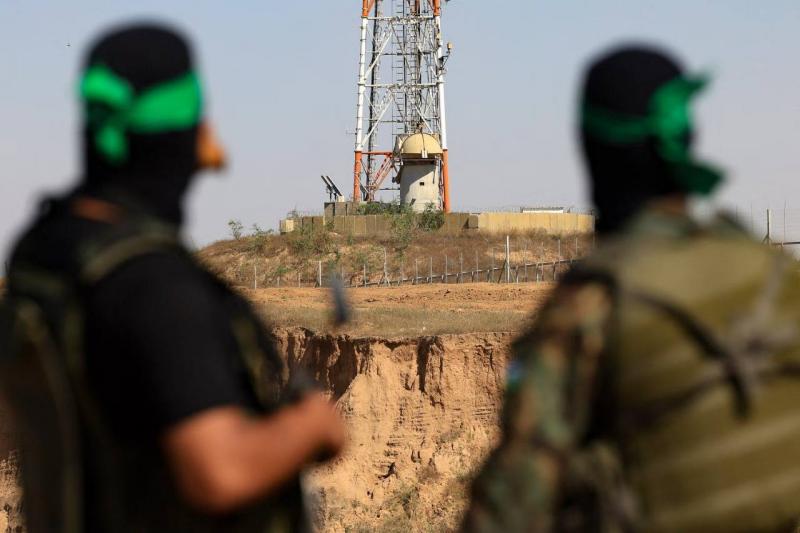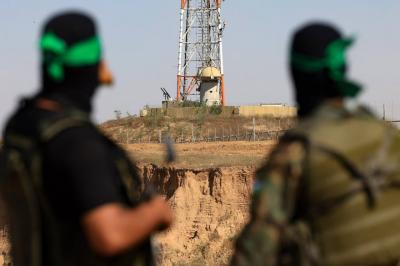As the devastating war in Gaza approaches its seventh month, the popularity of Hamas, which has controlled the Palestinian enclave since 2007, remains in doubt. Analysts believe that the dire humanitarian conditions faced by residents of Gaza have contributed to the decline in Hamas's popularity. In stark contrast, the movement enjoys high levels of support in the West Bank, according to recent opinion polls.
Before the war erupted, the latest surveys revealed that residents of Gaza "did not have much trust in their government led by Hamas," according to the Arab Barometer, an independent, non-partisan research network that provides insight into the social, political, and economic trends and values of ordinary citizens in Arab countries. When asked about their trust in Hamas authorities, 44 percent of respondents said they did not trust Hamas at all, while 23 percent indicated "not much trust." Only 29 percent of residents expressed a "great deal" of trust in their government. Furthermore, 72 percent stated that there was a significant level of corruption within government institutions, while a minority believed the government was taking genuine steps to address the issue.
Recently, a poll published last week by the Palestinian Center for Policy and Survey Research—an independent, non-profit, non-governmental academic research institution—indicated that 59 percent of Palestinians (64 percent in the West Bank and 52 percent in Gaza) preferred Hamas governance after the war. This figure is lower than the 60 percent reported in a previous survey conducted by the same center three months earlier. However, notably, the support in Gaza increased from 38 percent in January to 52 percent in April, which the center described as "one of the most important findings" of the latest poll.
On a political level, support for Hamas decreased from 43 percent to 34 percent in the first three months of 2024, according to the latest survey conducted by the Palestinian Center in early March and published in mid-April. In a conversation with the British "Financial Times," Khalil Shakaki, head of the Palestinian Center for Policy and Survey Research, stated, "There is no doubt that support for Hamas is declining in Gaza; more people feel that Hamas bears part of the responsibility for the pain they are experiencing."
Since taking control of the Gaza Strip in 2007, Hamas—designated a terrorist organization by the United States—has ruled "with an iron grip," as noted in the same report. According to the British newspaper, "the willingness of Palestinians in Gaza to express their anger towards Hamas has increased in light of the accusations directed at the armed group for failing to anticipate the significant Israeli retaliation following the attacks of October 7, which sparked the war." Hamas launched an unprecedented attack on Israel, resulting in the deaths of about 1,200 people, mostly civilians, including women and children, according to Israeli authorities. After more than six months of war led by Israel against Hamas, more than 34,000 people have died, most of whom are civilians, according to health authorities in the enclave, which do not differentiate in their tally between militants and civilians. The brutal war has turned the coastal enclave into ruins, leaving residents in catastrophic conditions with the risk of famine, prompting many to break the silence and speak out against Hamas, as stated by the "Financial Times."
Nassim, a retired government employee from Rafah in the southern Gaza Strip, where more than a million people seek refuge near the border with Egypt, said, "They should have anticipated Israel's reaction and thought about what would happen to the 2.3 million residents of Gaza who have nowhere safe to go." He added that the armed group should have targeted military sites only. Similarly, Mohammad, another resident of Gaza who spoke with the "Financial Times," blamed Hamas leader Yahya Sinwar, whom Israel considers the mastermind behind the bloody October 7 attacks. Mohammad stated, "I pray every day that those who brought us to this situation are punished... I pray every day for Sinwar's death."
### Popularity in the West Bank
Analysts note that the lack of a strong internal security force from Hamas—who have been hiding to avoid Israeli attacks—has opened unprecedented space for those ready to vent their frustrations against the armed group and its leadership. Azmi Keshawi, a Gaza affairs analyst at the International Crisis Group, remarked, "Critics have become bolder because there is nothing to fear now." He added in his remarks to the British newspaper, "Hamas fighters are preoccupied with Israel and have no time to deal with ordinary people. Their police force is also under attack by the Israelis."
Additionally, some analysts believe that the disastrous humanitarian conditions experienced by residents of Gaza have contributed to Hamas's declining popularity, although wars with Israel typically boost the Islamic group’s standing. Mokhaimer Abu Saada, a political science professor at Al-Azhar University in Gaza, which has suffered destruction due to the war, stated, "People are no longer afraid," as quoted by the "Financial Times." Abu Saada, who left the enclave for Egypt late last year, added, "They have suffered like never before, and their situation is so dire that (expressing their opinions) makes no difference to them. They are already facing death."
Hamas has maintained "strong control over Gaza and its residents over the years, arresting critics and not allowing much space for dissent," according to the newspaper. In his comments to the British publication, Abu Saada indicated, "Hamas may be losing popularity in Gaza, but it still enjoys significant support in the West Bank and among Palestinians in Jordan, Syria, and Lebanon." Regarding the reasons behind increased support for the movement in the West Bank compared to Gaza in recent opinion polls, he pointed out that "Hamas is widespread throughout Palestinian territories for national reasons rather than ideological ones." He continued, "I defend Hamas for national considerations, not for its Islamic ideology. Hamas puts its national vision at the forefront before its ideology, which is why the West Bank views it from this angle."
The Palestinian political analyst also highlighted that "all opposition forces are continuously improving their situation" due to "the general dissatisfaction with the Palestinian Authority." He further stated, "There is widespread public frustration with the conduct of the authority and its disregard for the decisions of legitimate institutions that called for ending security coordination with the occupation and reassessing the economic agreement. Other forces are politically improving due to the official Palestinian policy."




